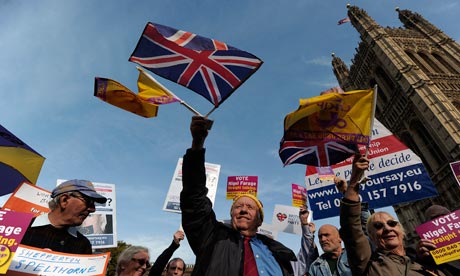British MPs have approved the EU Referendum Bill. No doubt, Prime Minister David Cameron and the ruling Conservative Party ran a great risk putting the issue to vote. Polls say nothing threatens the UK’s European membership as the majority of British voters support it. But it’s not just an in-out vote (if it were the case, there would be no need to hold the referendum). A huge pile of unsolved problems (or even unsolvable ones) dividing Brussels and London makes the choice much more complicated.
Great Britain has always been an enfant terrible of United Europe. It joined much later that the six founding states overcoming the resistance of those who opposed the motion inside the country. It is the only country which has joined neither the Schengen area, nor the eurozone.

Still the desire to rein in what is seen as «too much bossiness from Brussels» is too strong. The government believes too much authority has been delegated to Brussels. The EU wants no limitation on superpowers it possesses. It became clear in 2004 as it expanded from 15 to 25 member states. Not all new members were leading European economies. So called «Polish plumbers» did not really threaten the labor market of «old Europe», but they provoked the media campaign against the uncontrolled inflow of immigrants. Back then the UK maintained a distinctive position.
11 years have passed since then. The situation has gone through drastic changes. The problem of Polish labor immigrants is not a burning issue anymore. The united Europe applies great efforts to impose its liberal values (painting them as universal) throughout the whole world. The wave of immigrants from North Africa hitting the «old continent» is a direct consequence of «civilized» Europe meddling into internal affairs of Africa, for instance Libyan leader Muammar Gaddafi was assassinated as a result of such policy. The European intervention into Libya brought chaos and bloodshed to neighboring countries.
The conflict in Ukraine was initiated by Europe encouraged by its boss – the United States. The very thought of what implications the conflict can have gives the creeps. The calls for tolerance at the time of immigration growing by leaps and bounds provokes rising protests inside Europe. Today, Eurosceptics and right wing nationalists have become a political force to reckon with in a number of countries (as big as France, for instance) and the European Parliament. True, in Great Britain UKIP got only one seat in parliament. It just shows howdysfunctional the majority voting system is. UKIP finished third ahead of the oldest and, until recently, popular party – Liberal Democrats.
Anti-EU sentiments are strong among Tories. At least five members of cabinet are Eurosceptics. Under the circumstances the referendum results may become a big surprise.
David Cameron believes that the threat of withdrawal would scare Brussels to make it make concessions. Thus, the very idea of holding the referendum is nothing else but an instrument of outright blackmail used by London. Evidently, the incumbent government has no intention to leave the European Union. Cameron was unambiguous about it warning cabinet ministers to back the government on Europe or he would sack them. Polls show that people support Cameron: the majority says yes to the EU membership. Looking back at the dynamics of changing public opinion during recent years one can see the support is not strong enough to guarantee the yes vote. Sentiments are changing. The referendum is slated to take place before December 31, 2017. Forecasts say it will take place earlier, probably in 2016. The outcome is unpredictable.

Will Brussels cede or resort to pressure? There are signs it has chosen pressure. Heavy artillery is used. UK's credit rating downgraded to 'negative' by S&P on EU referendum risk. Some major financial funds have said they may relocate their headquarters from London. President Barack Obama joined in saying «We very much are looking forward to the United Kingdom staying a part of the European Union because we think that its influence is positive not just for Europe, but also for the world».
London is not the only headache for Brussels’ bureaucracy; the EU project is bursting at the seams throughout the whole Europe. The London’s blackmail may be just another step of the way of ultimate failure and collapse of the European superstate.









